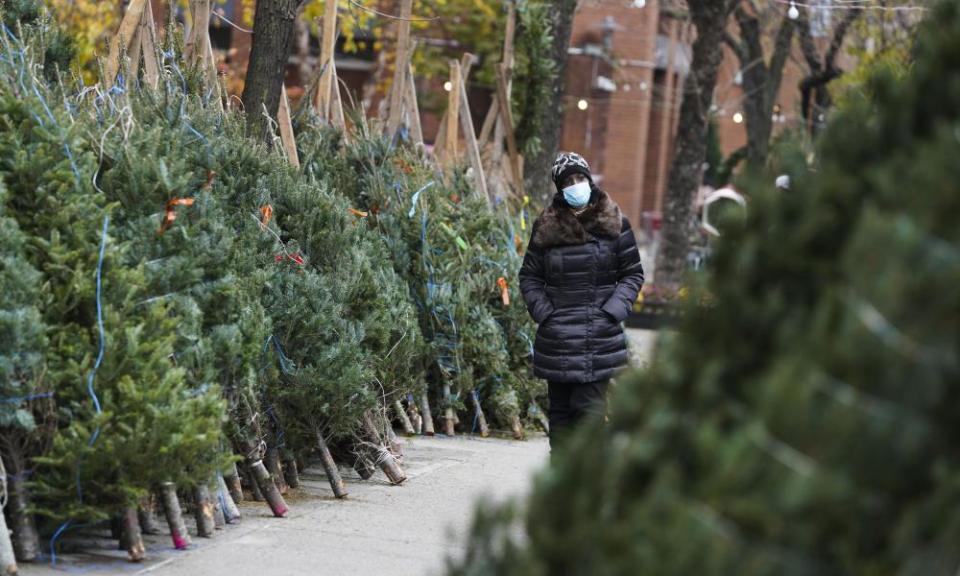Omicron brings fresh concern for US mental heath after ‘grim two years’

Sarah Isaacs, a therapist in Raleigh, North Carolina, sees mostly clients between the ages of 22 and 30, many of whom missed out on the usual dating and networking because of the Covid pandemic.
“They literally haven’t been able to do anything for two years,” said Isaacs, who specializes in working with people with eating disorders and people who identify as LGBTQ+.
They are just some of the people in the United States whose mental health has suffered during the pandemic. A Gallup poll conducted in November found that, like last year, only 34% of Americans describe their mental health as “excellent”. Those are the lowest levels in two decades.
Even though many people in the United States are now vaccinated against the virus and able to engage in something like a pre-pandemic lifestyle, the country’s population continues to suffer from anxiety and depression.
And now there are fresh worries about the Omicron variant and the impact it could have on public life this winter. The new variant – which, early reports suggest, could be more contagious than previous strains – is already spreading in the US, triggering concern. If Omicron does lead to another Covid-19 surge, the impact on mental health will be serious.
“Despite vaccinations, we still see that people are not back to pre-pandemic levels of wellbeing,” said Silvia Saccardo, a social scientist and co-author of a recent study on college students at the University of Pittsburgh students. “And they are not back to pre-pandemic levels of physical activity, which could have consequences as well, and this is quite worrisome, because if lifestyle habits and wellbeing don’t naturally rebound, it’s important to think about what to do, about interventions to help them.”
Psychologists and others who study mental health attribute the high rates of anxiety and depression to continued worries about the virus, and lingering trauma from the worst parts of the pandemic.
That is not unusual, said Sharon Hoover, co-director of the University of Maryland-based National Center for School Mental Health. For example, more than 18 months after Hurricane Katrina in New Orleans, 15% of youths exposed to the natural disaster continued to suffer from serious emotional disturbances, such as anxiety disorders, compared with a 4.2% national average, according to a study in the Journal of the American Academy of Child and Adolescent Psychiatry.
Like the twentysomethings Isaacs has seen, children and teens have also missed out on significant life events, Hoover said, and “that doesn’t get remedied overnight by reintroducing those things”.
“Many children and adolescents don’t yet have the coping mechanisms that they might need, and they are in some respects at the mercy of adults who are there to take care of them,” said Hoover. “It’s a grave mistake for people to say, ‘Our kids are going to be OK, it’s just the adults who are going to suffer.’”
The same concerns about mental health continue to linger on college campuses. Before the pandemic, in fall 2019, one-third of college students across the country reported that they were struggling with anxiety and a quarter reported depression, according to an American College Health Association report. A survey conducted by the organization in spring 2021 found that one in four students had screened positive for suicidal thoughts.
“If there are still concerns about a variant or who knows what may come down the road, that poses a lot of anticipatory anxiety,” said John Dunkle, a former director of counseling services at Northwestern University who is now a senior director with the non-profit Jed Foundation, a suicide prevention organization.
To combat what some public health groups have declared a national mental health emergency, schools must build up coping skills for adolescents in classrooms rather “than waiting for kids to get routed to mental health providers that they may not see for six months” in part due to a workforce shortage, said Hoover.
“We got kids back to school to improve their learning loss in the context of Covid, but we have to also be putting social and emotional supports in the school settings,” said Hoover.
While there is a shortage of mental health professionals in the United States, Dunkle said focusing on the number of providers at a counseling center should just be one consideration. Schools must also educate other staff on how to respond to students’ mental health needs and help students navigate insurance issues, he said.
Despite worries about students’ mental health struggles, Dunkle sees causes for optimism. In conjunction with Dunkle’s organization, Ithaca College recently established a “Stop and Breathe week”, aimed at helping “students cope with the stress of preparing for final exams”.
After two students at Saint Louis University died by suicide in September, the school canceled classes for a day to help students focus on mental health.
“That’s a good sign, where we say to students in the community, ‘Let’s stop and think about our mental health and balance,’” said Dunkle. Ideally, they would take such steps “proactively, not necessarily in the aftermath of a tragedy”.
Isaacs, the North Carolina therapist, also can take positives from recent reports on mental health in the United States. She and the other provider in her practice have a two-month waiting list of people seeking appointments, in part because therapy has become more normative, she said.
“I think the fact that people are seeking therapy in droves is a good thing,” said Isaacs. “It has been a grim two years, but I think everybody having it together at the same time has made people feel like they aren’t so alone.”

 Yahoo Finance
Yahoo Finance 